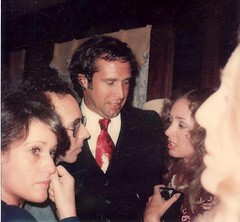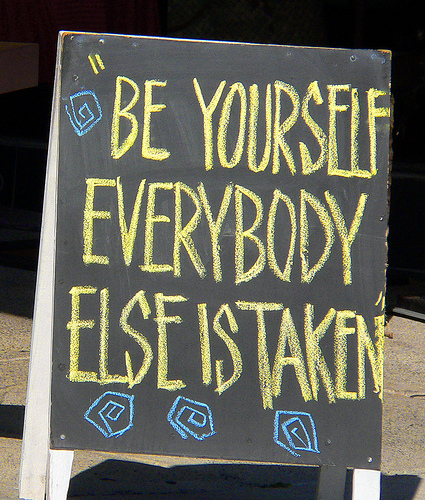What if I told you we have a super power in our 20s and early 30s?
What if you learned that this power is now at its peak and will recede with each passing decade?
What if you discovered that because of this power, we can attain one of our deepest-held goals in the here and now?
I'd imagine you'd want to identify and harness that power...or at least I'd hope you would!
So here's the big reveal: Our super power is <drum roll please> gratitude.
And if we don't use that awesome super power now, we may regret the oversight later.
Who to Thank
First, the big mistake: showing gratitude only to our favorites. Favorite coach. Favorite teacher. Favorite wacky librarian who strongly resembled Ms. Frizzle.
Good start.
But only a start.
What about that teacher who stayed long after school to help you master long division, or that coach who invited you over his house for dinners, or that mentor who came in early – leaving his young children behind – to spend time prepping you for your big meeting? These people all went beyond their job duties to invest in you.
They may not emerge in your mind as your “favorite” for myriad reasons – personality disconnects, the passage of time, a bad parting. But does that make their investment any less significant or worthy of appreciation?
Although someone may not be your favorite influencer, you may be their favorite investment.
Don't they deserve some credit? <Click to share this thought>
How to Show Gratitude
Which begs the question, how to give said credit.
After teaching college for ten years, I can tell you definitively how not to demonstrate gratitude: By sending an email filled with effusive praise...followed by the request for a favor (e.g., a reference).
Um, no.
That's called manipulation, not gratitude.
Yet 95% of the "thank you notes" I receive take this exact form. Not because millennials are entitled or narcissistic or any such generational sputum. Because they're human - busy and forgetful. Every generation is guilty of the same.
It's one thing if you've previously demonstrated gratitude and THEN come back months or years later asking for assistance. Influencers are more than happy to oblige. But don't go radio silent for five years and then show up all full of "appreciation" because you need something.
On the positive side, here is the best way to demonstrate appreciation: through as much "deed over word" as you can muster.
A non-requesting note is terrific. An in-person visit is even better. An invitation to a special event - graduation party, wedding, baby shower - is best yet.
Wait? Infuencers want to be invited to gift-bearing events? Isn't that like requesting a favor?
Yes, they do, and no, it's not.
Invitations are gifts in themselves. It's hard to remember this during the 20s and early 30s, when invitations are so abundant it feels like money is being sucked straight out of our pockets into silver-plated gifts and tacky outfits.
This period of abundance will end, though. And soon. Milestone, made-to-party events are a developmental patch that waxes then wanes, much like sleepover parties and all-nighters and binge-drink-a-thons.
In other words, it's likely your influencers' mailboxes aren't exactly overflowing with invitations.
Besides, even if your influencers happen to be the most popular people on the planet, if they took the time to invest in you, you are who they want to celebrate.
Which is exactly why invitations are the ultimate form of gratitude. Invitations aren't burdens, doled out to poor suckers who feel obligated to buy something for you. They are offers to share in your joy. They're a note saying, "You mean enough to me that I want you there when I celebrate a milestone in my life."
This is exactly what influencers want most: to see you thrive in life. Seeing you doing well is the great pay off on their investment.
What does it cost you, really?
(Psst - If you're worried about the concrete financial cost - which I hope you're not... - influencers tend to be in a much better financial position than your gaggle of friends. Put bluntly: you'll likely come out ahead. Far ahead.)
Gratitude Enables You to Make a Difference...Now
Not only does showing gratitude not cost you too much, it actually pays you: saying thanks enables you to meet one of your deepest-held goals. In the here and now.
That goal is "making a difference," cited in study after study as millennials' deep desire.
To be clear: we influencers don't take our jobs expecting a “thank you." Nor do we imagine we’ll ever need a “thank you” to keep us going.
Yet as reality settles in and we start to feel like we’re reaching about 1% of the population with which we work, it's easy to lose faith in our worldview.
Especially when the 1% don’t seem to recognize our efforts, either.
This is to say, by contacting an influencer and making a genuine gesture of appreciation, you don’t know what crisis of confidence you may be averting. You don’t know whether you might be contacting that influencer at the precise right moment to make them say, “oh thank goodness, I am doing something. This is just what I needed right now.”
Yours may be the letter or visit or invitation that enables the teacher/coach/mentor to buck up and go on to influence countless others.
As a result, in your act of gratitude, you become an influencer all your own, creating ripples that extend far beyond the one person you actively appreciated.
On an even larger scale, if you give away what you hope to one day receive, you contribute to a culture that provides ongoing fuel for investments in others.
If you hope for recognition in your future, you have to be willing to give it in your present. <Click to Tweet>
You Don't Have Forever
By now you may be thinking, "This is all well and good, but I'm so busy right now. When life calms down, I'll get around to showing gratitude."
First: HA! Life calms down! HA! Keep dreaming.
Secondly: Your influencers may not be around by the time you remember to thank them.
Not only can the random events of life snatch your influencers away - like my husband's beloved grade school principal who died not long ago in a car accident on his way to work - but odds of mortality increase with age. Of course.
And let's face it: your grade school influencers? They're getting up there now. Because (shh...), you're not exactly a spring chicken yourself any more.
Case in point: I had the opportunity to invite my grade school talented-and-gifted teacher to my college graduation, not only to attend, but to hear me give a brief speech about her work and to receive an award.
That opportunity reconnected us after a decade of silence. We then began corresponding with hand-written notes, visiting occasionally, and sharing my wedding day together.
She has since died of Alzheimer’s.
What at the time felt like an act of recognition for her now feels like an amazing gift to myself. It’s a moment I could not regain if I’d taken longer to recognize her influence on me.
Gratitude is a A Gift To Ourselves
Which leads to my final point: if you don't want to show gratitude for the sake of others, then at least demonstrate it for the sake of yourself.
As the uber-viral Soul Pancake video on gratitude demonstrates well, showing appreciation makes our lives happier, more satisfying and more meaningful. Sharing appreciation also reduces anxiety and depression, helps us sleep better, makes us more resilient, and strengthens relationships.
In other words, giving thanks provides the very feelings we search long and hard for on this site.
I can attest to this first hand. While I no longer can extend an invitation to my influencers - my milestone events have come and gone - I still reap the rewards of having done so: Ever since she was a baby, my three-year-old daughter has whiled away hours playing with the albums of casual photos taken at our wedding. In the past few months she has taken to coming up to me with the albums and asking, “who’s that?” Through this unplanned activity, I’ve had the occasion to tell her about my deceased grade school teacher, my now-retired physics professor, and my influential psychology professor.
Because of my demonstration of gratitude, I've gotten to share with my child the traits I admire most and concrete examples of lives that make a difference.
By looking at the wedding albums, my daughter is learning about giving and getting, about meaning and purpose, about influence and appreciation.
About, in short, all the intense, life-enriching emotions that make this life worth living.
And none of it would be possible if I'd forgotten to show gratitude while in my 20s.
Now I want to hear from you: What influencer are you going to reach out to...today?! And whose investment have you overlooked in our society's focus on "favorites"?
Photo Credit: Jeff S. PhotoArt


























